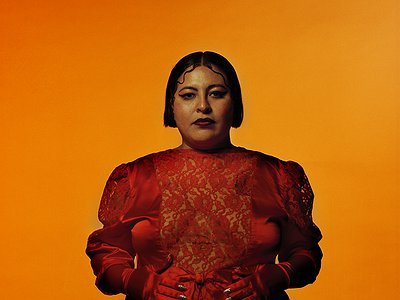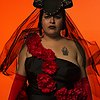Could you describe your creative process on the basis of a piece or album that's particularly dear to you, please? Where did the ideas come from, how were they transformed in your mind, what did you start with and how do you refine these beginnings into the finished work of art?
This album Capricho del Diablo, I wrote while on the farm in rural Jalisco with my aunt who never married. I spent time with her, helping her clean the house she inherited after my grandparents died and make food and watch telenovelas. I would retire after each meal and cleaning into a double room that my mother and her 6 other sisters used to sleep in to write music almost every day. I was there at the beginning of my Saturn return when I practically ran away from my queer community in the bay area to reflect with the intention of writing more work. The idea for the album started with me singing “Me demando ese salvador” to a very raw cumbia rhythm, in harmony and on a loop. I was reflecting on the trauma of a “manager” that acted as my “white savior” who later threatened to sue me over a small gift he gave me.
I then paired three-part harmony loops to traditional cumbia rhythms and I sang on top of those textures. The ideas did not realize completely until I found other people to make the music with me in LA, where all those ideas have come to life in full band format.
There are many descriptions of the ideal state of mind for being creative. What is it like for you? What supports this ideal state of mind and what are distractions? Are there strategies to enter into this state more easily?
My ideal state of mind for creativity is when I feel like a hermit. It was easy on the farm to not want to socialize because everyone thought I was a witch. Places where I’m not tempted to have a social life are perfect for me to sit record and create. I can sometimes reach that mental space when I have a strong idea that I can’t ignore.
How is playing live and writing music in the studio connected? What do you achieve and draw from each experience personally? How do you see the relationship between improvisation and composition in this regard?
Live performances give the music personality so naturally. When I compose there needs to be improvisation first. I improvise best when I can make faces and move around as if I am performing for the godly audience of my nightmares and have the record button pressed to catch the moments. Sometimes, the improvisation is too perfect for me to change anything about it, but most of the times it’s about taking the improvised melodies and putting them on a piano and developing them into something more magical and haunting. I need both, the relationship is very fluid and I cannot have one without the other
How do you see the relationship between the 'sound' aspects of music and the 'composition' aspects? How do you work with sound and timbre to meet certain production ideas and in which way can certain sounds already take on compositional qualities?
There are times that a certain rhythm of an arpeggiation will form the basis for an entire new song. Sounds are very important, they bring me feelings and emotions and melodies which are very important for my song-writing process
Our sense of hearing shares intriguing connections to other senses. From your experience, what are some of the most inspiring overlaps between different senses - and what do they tell us about the way our senses work? What happens to sound at its outermost borders?
Touch is very important. The way our bodies relate to other bodies can produce involuntary sounds from your body especially in intimate sexual settings. A bad smell can make you want to vomit, a good fruit can make you moan. Everything relates in its more fluid form.
Art can be a purpose in its own right, but it can also directly feed back into everyday life, take on a social and political role and lead to more engagement. Can you describe your approach to art and being an artist?
I used to think I was just a musician, but my connection to art and collaborations with other artists is so seamless and fluid that I have had to stop denying my direct relationship to art. The way I think about concepts and develop those concepts in the form of song go beyond the structure of music and follow a concept that intertwines feelings with politics; class, race and sexuality. While performing, it all melts into spaces that celebrate my existence and some spaces that want nothing to do with my kind. This is survival in a harsh world that makes my existence hard to imagine.
It is remarkable, in a way, that we have arrived in the 21st century with the basic concept of music still intact. Do you have a vision of music, an idea of what music could be beyond its current form?
I don’t know if this idea is beyond its current form, but I imagine a day without all this technology; when we live on farms again and as communities we get together for never-ending jam sessions that are never recorded but are passed down through generations, playing with vocals and instruments with no amplification.



